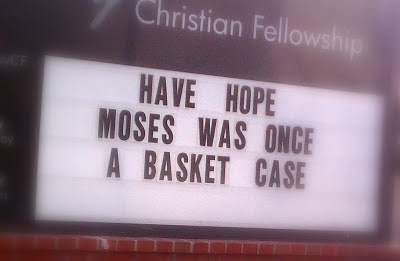Moses' Basket: Not the Right Basket for Professional Support
This is an apparently supportive advice delivered to one who is in some emotional or physical distress. And though one may find this advice displayed on numerous church boards for the public's humorous consideration, it "Have hope, don’t give up – remember Moses was once a basket case, too" provides an example, in my opinion, of how clinical advice if given from a physician to a patient should not be expressed. I believe the patient deserves such communication of advice be based upon facts which are presented with clarity and free of ambiguity and, in fact, free of humor. To me, humor can degrade any empathy by the physician that is appropriate to be transmitted to a patient in distress. I think it says to the patient, what you are experiencing is, to me, partly a joke.
In contrast, the example, I selected, while attempting to convey some sort of a supportive message for those who read it and need it, there is a derogatory but also that humorous tone, along with the use of non-factual ambiguity in order to make the point of the message. The facts which are missing are that "basket case" as defined by Merriam-Webster in its original World War I expression represented "a person who has all four limbs amputated" or it's more modern use "a person who is mentally incapacitated or worn out (as from nervous tension); also : one that is not functioning well or is in a run-down condition." Obviously, this does not apply to Moses, in the biblical description of his relationship to a "basket".
Trust is an essential part of the doctor-patient relationship, trusting the doctor's decisions and intentions is critical for the acceptance by the patient of the doctor's advice. While there are some patients who, on questioning, may not want all the facts of their condition displayed to them in one sitting and a few actually desiring others to know but not themselves, I doubt that any want the doctor to finally tell untruths, misleading information or add humor related to the patient's emotional and physical distress. Now I suspect that some of my visitors here may disagree with my commentary and may find some value to the patient for the doctor to present the advice in the form found written on those church displays. If so, I would like to read your view. ..Maurice.
Graphic: Photograph taken by me today at a neighborhood church and modified with Picasa3.


1 Comments:
I don't know how I'd feel to hear those words from a doctor, but I don't find the message itself inherently offensive. To me it tells the listener, you're not as bad off as you think, your problems are manageable, you have redeeming qualities (ha!). I believe the anxiety surrounding one's circumstances or condition can be more debilitating than the condition itself, so if a bit of humor helps to break through that anxiety and helps the person calm down, it's an effective and useful intervention. As to whether humor has any place in the doctor-patient relationship... well, it's a subtle question but I'd say in the context of an overall supportive relationship it is effective and useful. If the doctor is basically a stranger then no, humor is not appropriate. I recall in particular when my husband was post-appendectomy and the surgeon came around to discharge him, and was kidding around with me whether I was sure I wanted him back home. I had some questions to ask about his follow-up care and the surgeon did not address any of my question and continued in his jocular tone. That was unacceptable because I had no relationship with this physician and it was totally inappropriate in that context. But doctors can and often do use humor to good effect when it's intended to encourage and not belittle a patient.
CS CPNP
Post a Comment
<< Home